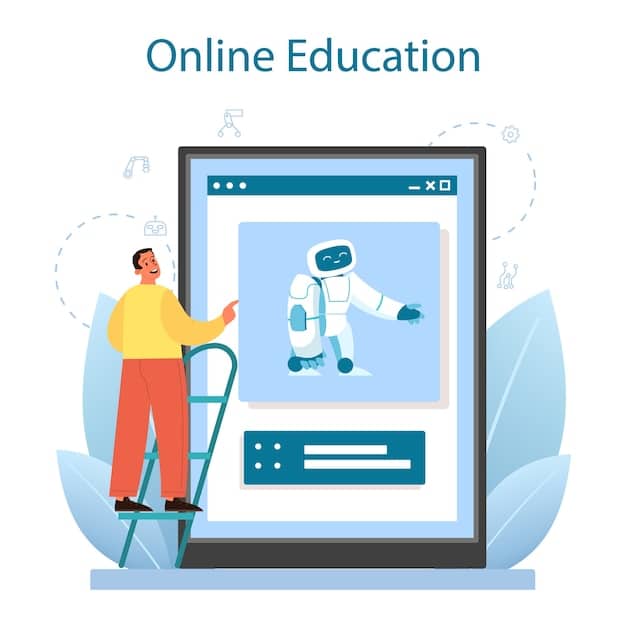Transforming Education: AI Tutors in US Schools for Personalized Learning

Transforming Education through personalized learning experiences is now achievable in US schools with the integration of AI tutors, offering customized support and accelerated learning paths for students.
The landscape of education in the United States is undergoing a significant shift. With the advent of artificial intelligence, personalized learning experiences are becoming a reality for many students. Transforming Education: Personalized Learning Experiences with AI Tutors in US Schools, we explore how AI tutors are revolutionizing the way students learn, offering tailored support and innovative educational approaches.
The Rise of AI Tutors in American Education
Artificial Intelligence (AI) tutors are increasingly being integrated into US schools, signaling a paradigm shift in educational methodologies. These AI-driven tools provide personalized learning experiences, catering to the unique needs and pace of each student. This technology promises not only to enhance academic performance but also to foster a more engaging and adaptive learning environment.
The implementation of AI tutors is more than just a technological upgrade; it represents a fundamental change in how education is delivered and received. These advanced systems are designed to offer customized support, identify knowledge gaps, and provide targeted interventions, ensuring that every student receives the attention they need to succeed.
Benefits of AI Tutors
AI tutors offer numerous advantages over traditional teaching methods, providing personalized support and enhancing learning outcomes.
- Personalized Learning: AI tutors adapt to each student’s learning style, pace, and preferences.
- Instant Feedback: Students receive immediate feedback on their work, allowing for quick adjustments and improved understanding.
- 24/7 Availability: AI tutors can be accessed anytime, anywhere, providing continuous learning support.
- Data-Driven Insights: AI systems provide educators with data on student performance, helping them tailor their teaching strategies.
These benefits collectively contribute to a more efficient and effective learning process, empowering students to achieve their full potential. AI tutors also free up teachers to focus on more complex tasks, such as fostering critical thinking and creativity in the classroom.

The integration of AI tutors also addresses the challenge of providing individualized attention in large classrooms. By automating routine tasks and providing personalized support, AI tutors enable teachers to focus on creating a more interactive and engaging learning environment for all students.
How AI Tutors Personalize Learning Experiences
AI tutors personalize learning experiences by leveraging data analytics and adaptive algorithms. These technologies allow AI systems to assess each student’s knowledge level, identify areas where they struggle, and tailor instruction accordingly. This level of personalization ensures that students receive the support they need, exactly when they need it.
The ability to adapt to individual learning styles is a key feature of AI tutors. Whether a student learns best through visual aids, auditory explanations, or hands-on activities, AI tutors can adjust their approach to match the student’s preferences. This flexibility enhances engagement and promotes deeper understanding.
Adaptive Learning Platforms
- Diagnostic Assessments: AI tutors use diagnostic assessments to identify a student’s strengths and weaknesses.
- Personalized Content: Based on the assessment, AI tutors curate content that is tailored to the student’s specific needs.
- Real-Time Adjustments: AI tutors continuously monitor student progress and adjust the learning path accordingly.
- Feedback Loops: AI tutors provide immediate feedback, allowing students to correct mistakes and reinforce learning.
Adaptive learning platforms powered by AI are transforming the way education is delivered. These platforms offer a dynamic and responsive learning environment that adapts to the unique needs of each student, ensuring that no one is left behind.
Moreover, AI tutors can provide personalized feedback that is both timely and specific. This helps students understand their mistakes and learn from them, fostering a growth mindset and encouraging them to persevere through challenges.

The Impact of AI Tutors on Student Achievement
The impact of AI tutors on student achievement is significant. Studies have shown that students who use AI tutors often demonstrate improved academic performance, increased engagement, and greater confidence in their abilities. These positive outcomes are attributed to the personalized support and adaptive learning experiences provided by AI tutors.
AI tutors can help students master challenging concepts by breaking them down into smaller, more manageable steps. This approach reduces frustration and promotes a sense of accomplishment, motivating students to continue learning and improving.
Case Studies: Success Stories
Several schools in the US have implemented AI tutors with remarkable success. These case studies highlight the potential of AI tutors to transform education and improve student outcomes.
- School A: Saw a 20% increase in math scores after implementing an AI tutor program.
- School B: Reported improved student engagement and reduced dropout rates with the use of AI-driven personalized learning platforms.
- School C: Experienced significant gains in reading comprehension among students who used AI tutors for targeted interventions.
These success stories demonstrate the transformative power of AI tutors. By providing personalized support and adaptive learning experiences, AI tutors can help students of all backgrounds achieve their full potential.
Furthermore, AI tutors can provide educators with valuable insights into student learning patterns. This data can inform instructional decisions and help teachers tailor their teaching strategies to better meet the needs of their students.
Addressing Challenges and Concerns
While the integration of AI tutors offers numerous benefits, it also presents several challenges and concerns. Addressing these issues is crucial to ensure the successful and equitable implementation of AI-driven education.
One of the primary concerns is the potential for technological disparities. Not all schools and students have equal access to the technology and resources needed to implement AI tutors effectively. Bridging this digital divide is essential to ensure that all students can benefit from these innovative tools.
Key Challenges
The implementation of AI tutors faces several challenges that need to be addressed for successful integration.
- Data Privacy: Protecting student data and ensuring privacy is paramount.
- Equity of Access: Ensuring that all students have equal access to AI tutors, regardless of their socioeconomic background.
- Teacher Training: Providing teachers with the training and support they need to effectively integrate AI tutors into their classrooms.
- Algorithmic Bias: Addressing potential biases in AI algorithms to ensure fair and equitable learning experiences for all students.
These challenges underscore the need for careful planning and thoughtful implementation. By addressing these concerns proactively, we can harness the power of AI to transform education in a way that is both effective and equitable.
Another concern is the potential displacement of teachers. However, AI tutors are not intended to replace teachers but rather to augment their abilities. Teachers play a crucial role in fostering critical thinking, creativity, and social-emotional development, which are areas where AI cannot fully replicate human interaction.
The Future of Education with AI Tutors
The future of education with AI tutors is promising. As AI technology continues to advance, we can expect to see even more sophisticated and personalized learning experiences. This includes the development of AI tutors that can adapt to a wider range of learning styles, provide more nuanced feedback, and offer more comprehensive support.
AI tutors will also play an increasingly important role in lifelong learning. As the pace of technological change accelerates, individuals will need to continuously update their skills and knowledge. AI tutors can provide personalized learning pathways that help individuals stay current and competitive in the workforce.
Emerging Trends
Several emerging trends are shaping the future of education with AI tutors.
The integration of virtual reality (VR) and augmented reality (AR) technologies with AI tutors has the potential to create immersive and engaging learning experiences. Imagine a student learning about ancient civilizations by virtually exploring historical sites, guided by an AI tutor that provides personalized insights and explanations.
- Virtual Reality (VR): Immersive learning experiences that transport students to different environments.
- Augmented Reality (AR): Interactive overlays that enhance the real-world learning environment.
These technologies can help students visualize complex concepts and engage with learning materials in a more meaningful way. By combining the power of AI with the immersive capabilities of VR and AR, we can create truly transformative learning experiences.
Policy and Ethical Considerations
Policy and ethical considerations are paramount in the deployment of AI tutors. To ensure responsible and equitable use, clear guidelines and regulations are needed.
Data privacy is a crucial ethical consideration. Schools must protect student data and be transparent about how it is used. Parents and students should have the right to access and control their educational data.
Ethical Guidelines
Ethical guidelines for AI tutors are crucial to ensure responsible and equitable use.
- Data Privacy: Protecting student data and ensuring privacy.
- Algorithmic Transparency: Ensuring that AI algorithms are transparent and free from bias.
- Accountability: Establishing clear lines of accountability for the use of AI tutors.
| Key Point | Brief Description |
|---|---|
| 💡 Personalized Learning | AI tutors adapt to each student’s unique learning style and pace. |
| 📊 Data-Driven Insights | AI provides educators with data to tailor teaching strategies effectively. |
| ⏱️ 24/7 Availability | Students can access AI tutors anytime, enhancing continuous learning. |
| 🛡️ Addressing Challenges | Overcoming data privacy, equity, and bias issues is essential. |
Frequently Asked Questions
What are the main benefits of using AI tutors in schools?
▼
AI tutors offer personalized learning, instant feedback, and 24/7 availability, enhancing student engagement and academic performance. They also provide data-driven insights for teachers.
How do AI tutors personalize learning experiences?
▼
AI tutors use data analytics and adaptive algorithms to assess each student’s knowledge level and tailor instruction to their specific needs and learning style.
What are the challenges of implementing AI tutors?
▼
Challenges include ensuring data privacy, providing equitable access to technology, training teachers, and addressing potential biases in AI algorithms.
What role will teachers play in a classroom with AI tutors?
▼
Teachers will focus on fostering critical thinking, creativity, and social-emotional development, while AI tutors provide personalized support and automate routine tasks.
How can schools ensure the ethical use of AI tutors?
▼
Schools should establish clear guidelines for data privacy, algorithmic transparency, and accountability, ensuring that AI tutors are used responsibly and equitably.
Conclusion
In conclusion, the integration of AI tutors in US schools marks a significant step forward in transforming education. By providing personalized learning experiences and data-driven insights, AI tutors have the potential to enhance student achievement, increase engagement, and prepare students for the challenges of the future. While challenges and ethical considerations must be addressed, the benefits of AI tutors are undeniable.
Read more content





